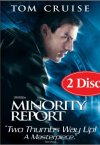BUY THE DVD:
|


|
|
|
SYNOPSIS:
| |
in the future, criminals are caught before the crimes they commit, but one of the officers in the special unit is accused of one such crime and sets out to prove his innocence.
|
|
|
MOVIE FACT:
| |
tom cruise's character drives a 2054 model lexus.
|
|
|
RATING:
|


two out of four possible stars
|
|
|
|
Everything Steven Spielberg has created for the screen in the past decade has been nothing short of the most visually stunning crop of movies ever to come out of a filmmaker's head. With critics, fans, and actors all singing the praises of this blockbuster director, his wide appeal is proven every time one of his movies hits theaters. But with this latest effort, Spielberg has switched to a different track than his previous adventures. Whereas the name Spielberg was once associated with pure candy and popcorn laced summer movies, he has lately wandered into a much darker area of the human consciousness to present his stories.
Beginning with 1997's "Amistad," Steven has transferred his directing talents to the more serious dramatic type films that have overshadowed every production he's helmed since. Though he's been involved in producing his usual flights of fancy (Men in Black and its sequel, Shrek, Evolution, etc.), whenever he sits in the director's chair now, he puts on a different hat. It may look like the same worn baseball cap that's always on his head, but his directing projects lately have been dark, depressing, and pedantic. A.I. was a prime example of Spielberg throwing his opinions at the audience and making them digest quite a strong message. And Minority Report is alike in this regard, though to a somewhat lesser degree.
It is not that Spielberg has "lightened up," but rather that this film's large element of predictability keeps it from becoming something from which a lesson can be learned. Suffice it to say that the lesson presented in this film, which is perhaps more of a paradox, doesn't make so much of an impact when it is so easy to guess what's coming next. In true science fiction style, this film has a number of twists and turns designed to keep the audience on their toes. Many of the problems that crop up for the characters don't seem so twisted. The author of the short story this movie was based on, Phillip K. Dick, was the creator of the stories from movies such as Total Recall, Blade Runner, and the dismal 2002 film, Impostor.
It is clear that Dick's stories do not automatically transform themselves into a hit movie, considering the hit and miss record of those films. And Minority Report is nothing if not a dark vision of the future, a characteristic that seems to crop up in all his stories. There's always something wrong with the future, and the characters usually have many flaws. Like in this film, Tom Cruise's character, "John Anderton," is a drug addict and has lost his son. And the lives of the people around him are not painted as being that enjoyable. All the technological advances of the world in the year 2054 have not made life better for the majority of citizens.
And so regardless of how this film ends, the audience is fully aware that the world at large is a depressing place without a lot of hope. But leave it to Steven Spielberg to assemble a cast that tries its best to overcome the bleak outlook always present in the film. There is a subtle amount of humor in the film, usually an ironic type, which serves to take some of the weight off the shoulders of the audience. As viewers of the film must always deal with an incessant clock (a rather good feature to get the audience hooked on watching), some of the lighter moments in the film are quite a relief. Even films like Alien have moments of laughter between the characters, making their predicament no less daunting, yet somewhat more bearable for the audience.
Right off the bat, Colin Farrell makes quite a entrance as Tom Cruise's evil government pursuer. Though his character is supposed to be hated by the audience, Farrell's performance gives one the impression that he's just a guy trying to do his job. In that regard, he's very convincing in his role. And furthermore, it's proven in scene after scene that he can share the space on the screen to an equal degree with Tom Cruise. Though Cruise may be the larger of the two stars, Farrell is no less an impressive figure throughout the film. And speaking of larger personages, Cruise fills the boots of his role with the expected ease of the underrated actor he's perpetually become.
It is possible that he makes his performance so convincing and "easy" that his ability is actually hidden behind how expertly he can hide "Tom Cruise" inside a character on the screen. He also plays against the literal ticking clock in the film with a strength that keeps the audience motivated in wanting to see the end of the film. But even with these two actors' superior talent, there are many loose ends that fly around wildly during more than a few minutes. For example, two of the supporting characters act more than strange whenever they're on the screen, and their back-stories are never investigated, so their dialogue is many times a complete mystery.
And so, in what is fast becoming the current Spielberg Style, the story found in Minority Report won't wow audiences, but the film has enough popcorn value to be considered a Steven S. film. This film has its ups and downs, and its likeability probably boils down to whether audience members are willing to try something different from the master of summer blockbusters.
Review by Kelsey Wyatt.
| |
|